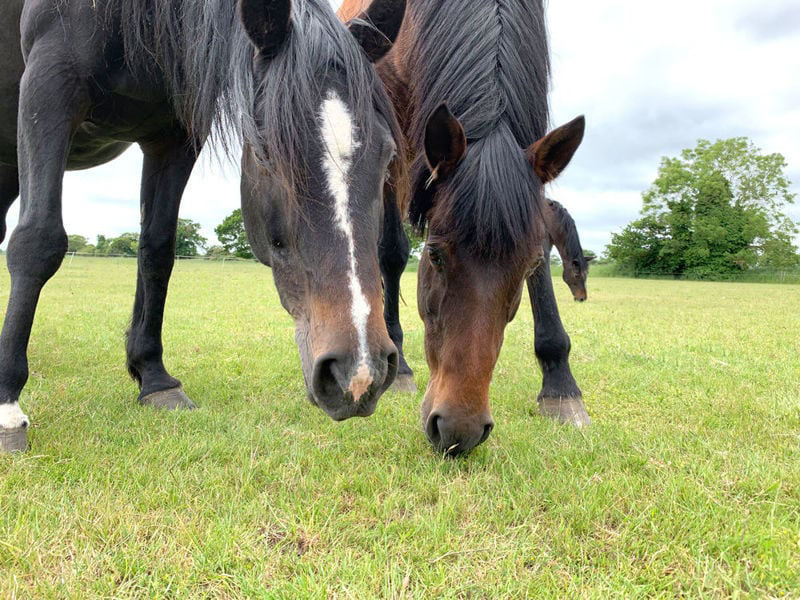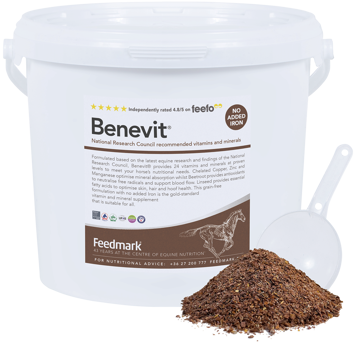If you have a good doer summer can be a stressful time with worries about unwanted weight gain and the issues that can come along with it.
Managing these types of horses can be hard as it can feel like you must constantly keep an eye on their weight and what they are eating otherwise the pounds will pile on overnight. We look at some key points for keeping their waistlines in check:
Feed an appropriate calorie intake
Being honest about your horse’s workload is the place to begin. Riders tend to overestimate how hard their horse is working and when the weather is hot it can certainly feel as though you are working really hard but in fact your horse isn’t.
A guide for the work level your horse is doing is:
| Light | Leisure or recreational riding and low-level training |
| Moderate | Frequent schooling with occasional competition |
| Hard | Frequent competition, high level schooling, polo, low – medium level eventing |
| Very hard | Racing, 3-day eventing |
Energy requirements
Knowing exactly how hard your horse is working will help to guide the calorie intake they require and allow you to adjust their feed and forage intake appropriately. A rough guide is:
| No work | 69.9MJ digestible energy per day |
| Light work | 83.7MJ digestible energy per day |
| Moderate work | 97.5MJ digestible energy per day |
| Hard work | 111.3MJ digestible energy per day |
Hay has an average energy content of 6MJ of digestible energy per kg, where as grass has an energy content of 8-10MJ/kg on a dry matter basis. On a dry matter basis, a horse turned out on different pastures could eat:
| Poor pasture/ restricted grazing | 112g per hour |
| Fair pasture | 225g per hour |
| Good pasture | 336.5g per hour |
| Excellent pasture | 450g per hour |
N.B. these are average intakes based on research; actual intakes can vary between horses.
Grazing matters
We all like to try and get our horses out for as long as possible when the weather is better as it not only saves on mucking out but means we don’t need to buy and feed hay (and it is nice to see our horses in the field on a sunny day!). Yet, for good doers, more time in the field leads to more time eating.
If your horse is turned out for 12 hours a day on good grazing, it could be eating 4kg (or more) of grass on a dry matter basis. Considering that this grass could provide 8-10MJ of digestible energy per kg this alone will be providing 32-40MJ DE which goes a good way towards their daily energy intake. If you are also feeding hay when your horses aren’t turned out it is very easy to meet (and even exceed) their daily energy requirements without extra feed. Restricting hay is harder as we wouldn’t recommend a horse goes more than 2 hours without anything to eat. If your horse needs its calorie intake controlled then reducing grass intake is a lot easier. This will allow you to feed enough hay when your horse is stabled.
Restricting grass intake via strip grazing methods or using a grazing muzzle will still allow for enough fibre and forage to pass through the horse’s gut to maintain digestive health. Using a grazing muzzle can reduce intakes by up to 80%, which works well for horses who have to be on a strict diet due to medical issues linked to obesity and weight gain.
Hard feed
If you have to manage a good doer over the summer months, consider not only the forage that they are eating but also their hard feed. Does their workload warrant a big bucket feed or can you make some changes to help reduce their calorie intake?
For a horse or pony in light or zero work a vitamin and mineral supplement is usually a great idea. This will provide all the nutrients that they need in a very low-calorie form. Good doers on a forage-based diet will need a balancer of some form to ensure that they are getting the right amount of daily vitamins and minerals as forage alone will not provide everything that the horse needs.
New Benevit is an ideal supplement to use over the summer months as it is a low intake, low calorie vitamin and mineral supplement. It has been formulated based on the latest equine research and findings of the National Research Council.
About Benevit™
Benevit™ provides 24 vitamins and minerals at proven levels to meet your horse’s nutritional needs. Chelated Copper, Zinc and Manganese optimise mineral absorption. Beetroot provides antioxidants to neutralise free radicals and support blood flow and Linseed provides essential fatty acids to optimise skin, hair and hoof health. This grain-free formulation with no added Iron is the gold-standard vitamin and mineral supplement and is suitable for all.













